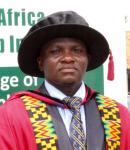
Born to a retired educationist and a midwife in the Brong Ahafo Region of GhanaJoseph Adjebeng-Danquah was raised by his late grandmother whose major occupation was farming. I remember how my grandmother selected the best fruitscobs and disease-free planting materials for cultivation at the beginning of each season.Crop improvement through mass selectionhas always been of interest to Joseph. This interest was given a professional boost when he took lessons in geneticsintroduction to plant breedingplant propagation among others during his undergraduate studies at the Department of Crop and Soil Sciences of the Faculty of AgricultureKwame Nkrumah University of Science and TechnologyKumasi. Joseph was invited to the department on completion as a teaching and research assistant. His interest in plant breeding was further ignited following his attachment to the breeding section of the department as an assistant to the then national coordinator of the Root and Tuber Improvement Programme (RTIP). During this periodhe learnt a lot of breeding principles to address some of the numerous challenges facing cassava cultivation particularly in the Northern Region of Ghana. He further pursued a Masters Degree in Plant Breeding with cassava as the reference crop. Since March 2008Joseph has been working with the Savanna Agricultural Research Institute of the Council for Scientific and Industrial Research (CSIR). His responsibilities include both on-station adaptive and on-farm agronomic research activities.Through my interaction with farmersI have come to appreciate what problem-solving and demand-driven research activities are all about Joseph says. Cultivating cassava which normally takes 12 months to mature in a 5 month mono modal ecology is a very big challenge particularly in the northern parts of Ghana. This is the more reason why an opportunity to develop drought-tolerant cassava for the northern part is timely.An opportunity to pursue a PhD in Ghana under the sponsorship of the Generation Challenge Programme is an opportunity I find very hard to resist. With my training at WACCII will be better positioned to identify ways of overcoming physiological and agronomic limitations facing the survival of cassava in a drought prone environment. This will help boost cassava yield in the north and help combat extreme hunger and poverty which are key components of the Millennium Development Goal.
